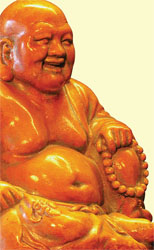He’s a lucky charm, but is he really the Buddha? The ‘Laughing Buddha’ is the most popular luck charm being passed around the world. But there’s a confusion surrounding his name. A Chinese folklore deity, he is called the Budai for his jolly countenance. He’s often seen as a wandering, cheerful monk, with a large protruding stomach, wearing a robe, and carrying sackcloth.
Sometimes he shown seated on a cart drawn by boys, or holding an oogi (a wish giving fan). While Japan refers to him as Hotei, one of the Seven Lucky Gods and the patron of poor children, some Buddhist traditions believe him to be Maitreya, the future Buddha. Messages of peace, generosity, wisdom and kindness are attributed to him. According to legend, if one rubs the Laughing Buddha’s great belly, it brings forth wealth, good luck, and prosperity.
Confusion
Budai is often confused for the Buddha in West. But in reality, the Chinese name Budai has no connection with the Sanskrit word, Buddha.
Trivia
The ‘Laughing Buddha’ as Hotei is also said to be the patron saint of restaurateurs and fortunetellers.
Charm quotient
The ‘Laughing Buddha’ is popular as a house-warming gift. It is best to be gifted one, than buying it, should be kept on an elevated surface facing the main door, and never on the floor. It should also not be kept in the bedroom or the dining room.
